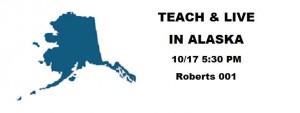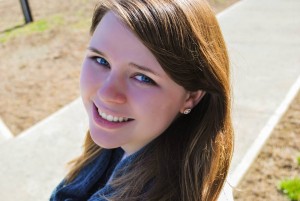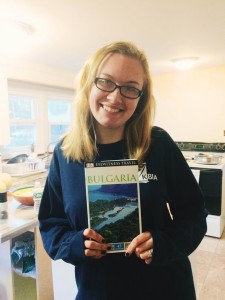The University of Maine at Farmington is proud to offer many various travel courses to students throughout the year. Travel courses are offered in January during winter break and in May/June once school is out. Each course is about two to three weeks and can be taken for 2 or 4 credits.
Recent travel courses have gone to the Virgin Islands, Cypress, Ireland, Japan and have studied topics such as business, anthropology, economy, and more! UMF travel courses are designed for all students, not just those in the field of study of the course! Brittany Jerome, an upcoming senior at UMF, is an early childhood special education major and just participated in the anthropology course to Peru. Ed360 caught up with Brittany after the trip to learn more about the experience she shared with peers.
When asked why she chose Peru, Brittany had one simple answer- why not?! “I love to travel, and Peru is such an interesting country filled with so much culture. I was taking an introduction course to anthropology with Nicole Kellett in the fall of 2016 and she told our class about the trip. I went to the first informational meeting and left knowing I had to go. Two and a half weeks in another country, getting credits for it, and learning from two professors who have spent a significant part of their lives in Peru and who have an enormous amount of love for the country and the people- how could I say no? I would never get an opportunity like this again, so I had to take advantage of it.”
Dr. Nicole Kellett and Dr. Lucas Kellett are both anthropology professors at UMF. They both lived in Peru during their graduate studies and have been back to visit many times on their own, with their children, and multiple times as leaders of the UMF travel course. The knowledge they both share about the culture, environment, economy, and the history of Peru makes them perfect leaders for such a trip.
The Peru 2017 travel course accommodated both of the Kelletts and fifteen students. Those students come from various majors and fields of study, such as anthropology, education, international global studies, psychology, community health, and more! “Anyone is able to make a connection to such a course and use the experience to grow both personally and professionally,” said Brittany.
The students that traveled to Peru were busy, that is for sure! Over a course of eighteen days they stayed in six locations, hiked two mountains, visited many archeological sights, and learned more than they ever would in a classroom. Brittany gave the following summary of their time abroad:
“We arrived in Lima, the capital of Peru, late on a Tuesday night. Over the next few days we ventured out into Lima. We got to visit an archeological sights, including Pachacamac [pictured right], which was on of my favorites! We also got to visit a cathedral and a few museums. A couple of days later we departed from Lima and flew into the Andes into a community called Andahuaylas.
In Andahuaylas, we stayed in this cute camp-like place called Munay Wasi. We spent our first full day visiting the archeological sight of Sondor and hiking Achanchi, a peak that was part of the Andes Mountain Range! We had lunch on a lake and got to meet some of the Kelletts’ family friends. The next day we went to Sacclaya, a beautiful community that is tucked away in the mountains. Luke and Nicole lived in Sacclaya for a year at one point, so they knew some of the locals. We got to tour the schools, play with the children, eat a traditional Peruvian dish of cuy (fried guinea pig- don’t knock until you try it!) and play soccer with some of the women in the community. It was such a fun day! The next day, Sunday, we got to walk around the regional market in Andahuaylas, which is the second largest market in Peru. People were selling food and fresh juice, jewelry, textiles, clothes, toys, and even some animals. It was really cool to see how the economy in such a rural community works on such an important and busy day to the locals.
The next day we took a long bus ride to Cuzco, where we got to explore some interesting archeological sights surrounding the city. We also took a tour of the Sacred Valley, including sights such as the the Pisac market and ruins and Ollantaytambo. We then took the train to  Aguas Calientes, where we spent the night before visiting Machu Picchu. Machu Picchu was incredible. You see pictures of it online and in books, but nothing is as breathtaking as seeing it in person. We walked around the sight and then hiked Hyuana Picchu, the big peak that sits right behind Machu Picchu. On our way back to Cuzco we were able to visit some salt mines and Inca terraces. The next day, we traveled to the Amazon Rainforest.
Aguas Calientes, where we spent the night before visiting Machu Picchu. Machu Picchu was incredible. You see pictures of it online and in books, but nothing is as breathtaking as seeing it in person. We walked around the sight and then hiked Hyuana Picchu, the big peak that sits right behind Machu Picchu. On our way back to Cuzco we were able to visit some salt mines and Inca terraces. The next day, we traveled to the Amazon Rainforest.
The rainforest was amazing. We first got to visit a community and a school, where the children put on a  dance performance for us and played various games with all of us. Then, we rode a motor boat up an Amazon tributary called the Mother of God, where we were able to jump off of a rock into the tributary and ride the current down to the beach. We then ventured into the heart of the jungle where we spent two nights. The guides that we had were so kind and knowledgable- they could just look at a plant or a butterfly or a bird and know the exact species and how they live and survive. One guide took some of us on a night walk where we crept through the dark in search of anything interesting (we mostly just saw a ton of spiders). They also taught us about the resources in the jungle, such as medicinal plants and various foods. One of our guides even used his personal experience to tell us how to survive if we are to ever get lost in the jungle. I was amazed by the rainforest.
dance performance for us and played various games with all of us. Then, we rode a motor boat up an Amazon tributary called the Mother of God, where we were able to jump off of a rock into the tributary and ride the current down to the beach. We then ventured into the heart of the jungle where we spent two nights. The guides that we had were so kind and knowledgable- they could just look at a plant or a butterfly or a bird and know the exact species and how they live and survive. One guide took some of us on a night walk where we crept through the dark in search of anything interesting (we mostly just saw a ton of spiders). They also taught us about the resources in the jungle, such as medicinal plants and various foods. One of our guides even used his personal experience to tell us how to survive if we are to ever get lost in the jungle. I was amazed by the rainforest.
We had one final day in Cuzco before departing, where some of us shopped, some went to a few museums, and others just enjoyed exploring the city to it’s fullest. While in Peru we spent time in rural highlands, the lush rainforest, and bustling cities. There was something for everyone to enjoy.”
Sounds like there was a lot to do, and everyone, despite their field of study, was able to make a connection somehow. “While the course was titled ‘Andean Exploration: Past and Present’ and we focused mostly on the Incas and the development of Peru over the years,” said Brittany, “when you spend as much time in another country as we did you learn and take in so much more information that what is academically provided. As an education major, it is important to be culturally competent and understand that other cultures may do things that you do not understand, but you need to respect them. Really, being culturally competent is important in any field where you will be working with people. I think anyone can really make a professional connection when traveling and use their experiences to build on their professional development.”
 When asked about her favorite part of the trip, Brittany warmly said, “Out of all of the amazing things we saw and did, my favorite aspect of the trip is the family we became by the end of it. Most of us did not even know half of the people on the trip when we started, but even by the third day we had all made connections, learned from and supported each other, and made some awesome friendships. Other than that, I really enjoyed visiting Sacclaya and playing with the children there. Even though there were some language barriers, I was able to interact with the children and have fun!”
When asked about her favorite part of the trip, Brittany warmly said, “Out of all of the amazing things we saw and did, my favorite aspect of the trip is the family we became by the end of it. Most of us did not even know half of the people on the trip when we started, but even by the third day we had all made connections, learned from and supported each other, and made some awesome friendships. Other than that, I really enjoyed visiting Sacclaya and playing with the children there. Even though there were some language barriers, I was able to interact with the children and have fun!”
Museums, archeological sights, hiking, cities, this trip offers something for everyone! You do not need to be a world traveler, a trained mountain hiker, or an anthropology student to enjoy a trip like this, you just need to be open minded and have the desire to learn and explore! “If you have the opportunity to go on a travel course, do it!” said Brittany. “You will not regret it. You’ll be learning from experts and sharing this experience with other UMF students who have similar interests. I wish I had known about these courses sooner, I would do one every year if possible!” For more information about the travel courses offered here at UMF and other UMaine System schools, visit the Travel Course and International Exchange Programs page.
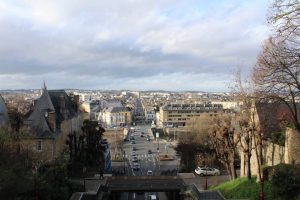 more proficient in French and to teaching English to the students in Les Mans. Hannah studied abroad for the spring 2016 semester in Les Mans (pictured right), so she is already familiar with the area. Hannah said she is also looking forward to traveling and seeing more of France and Europe.
more proficient in French and to teaching English to the students in Les Mans. Hannah studied abroad for the spring 2016 semester in Les Mans (pictured right), so she is already familiar with the area. Hannah said she is also looking forward to traveling and seeing more of France and Europe.




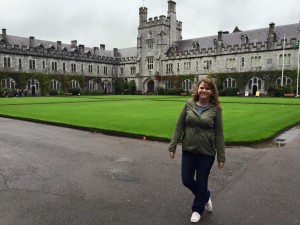
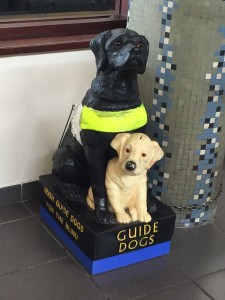 e Deaf, both Americans and Irish went to the same country to learn it, which was France. I found that really neat! That being said, there are a few differences I’ve also found. First, there seems to be a lot more non profit organizations supporting people with disabilities in Ireland. For example, one of my first days going into the city, there were some people asking for donations for
e Deaf, both Americans and Irish went to the same country to learn it, which was France. I found that really neat! That being said, there are a few differences I’ve also found. First, there seems to be a lot more non profit organizations supporting people with disabilities in Ireland. For example, one of my first days going into the city, there were some people asking for donations for 